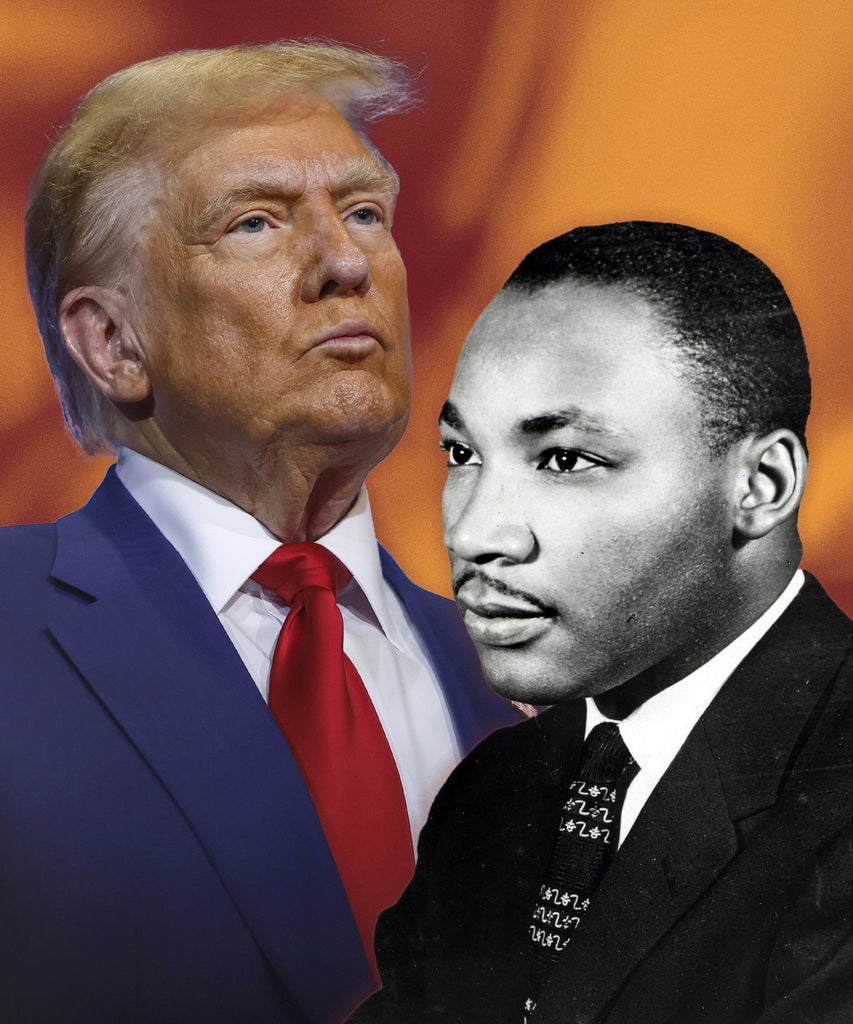Trump’s Inauguration Day Is Also MLK Day. The Contradiction Is Astounding & So American

Today is Martin Luther King Jr. Day, a holiday that Coretta Scott King worked tirelessly to bring to fruition. A day to remember the life and legacy of a man who stood against the triple evils of racism, poverty, and militarism. Today is also the day when Donald J. Trump will be inaugurated as the 47th President of the United States, his second term in office. Today is a day of contradiction. And yet, this juxtaposition might be exactly what America needs to see itself more clearly. As Dr. King’s youngest daughter and CEO of the King Center, Bernice King, stated, “This nation will be confronted with the sharp contrast between my father, who espoused love and justice, and Trump who has often sanction[ed] hatred and injustice.” What will do when face-to-face with who we’ve become as a nation?
In the days leading up to the Inauguration, various pre-celebrations were hosted by Trump’s allies. Friday night was the most full evening as the Kentucky Bluegrass and Crypto Balls brought celebrities, politicians, and executives together for their victory lap. The Bluegrass Ball, hosted by the Kentucky Society of Washington, seemed to be more intimate whereas the Crypto Ball boasted an audience full of tech and cryptocurrency executives as well as performances by Black male rappers including Snoop Dogg, Soulja Boy, Nelly, and Rick Ross. Their presence sparked instant outrage online and by Black members of the media like Don Lemon who called out the hypocrisy and greed of these performers, and particularly Snoop Dogg who previously had a lot to say about Kanye West and other Trump-supporting Black celebrities. During his commentary on the ball, Lemon highlighted tweets and social media posts wondering what changed for Snoop Dogg besides a paycheck.

As some celebrated in D.C.’s ivory halls, thousands more descended upon the city to express their disgust, outrage, and anxieties for the months and years to come. The People’s March, as it was dubbed, was intended to be a resistance effort but the solemn mood mirrored how drained and exhausted people have become over the last eight years since Trump first assumed office. In response to him first being installed, millions made their voices heard not only in D.C. but also at sister marches around the country and even internationally. Now, with even more of an understanding of what to expect, people seem to have even less energy to fight it.
Trump — with his crass words and absurd policy proposals — has had progressives playing defense for nearly the last decade. Now, we are on the verge of four more years of responding to Trump’s absurdity. Social media platforms are transforming before our eyes with Mark Zuckerberg endorsing a return to “masculine energy” in tech (whatever that means) and Elon Musk eroding diversity, equity, and inclusion not only via Twitter/X but also in his projected position within the newly established “Department of Government Efficiency.” Toni Morrison talked about this and similar phenomenons years ago: “The function, the very serious function of racism is distraction.” She continued, “it keeps you from doing your work. It keeps you explaining, over and over again, your reason for being.” The answer is not to get lost in the dizzying cycle or become too weary to both fight back while developing our own proactive vision.
This nation will be confronted with the sharp contrast between my father, who espoused love and justice, and Trump who has often sanctioned hatred and injustice.
bernice king via instagram
What would Dr. King have to say about a man like Trump being inaugurated to the highest position in the land, and on a day dedicated to his legacy? One need only look to King’s last Sunday sermon which he delivered less than a week before his assassination and titled, “Remaining Awake Through A Great Revolution.” After a brief introduction, King cut to the chase: “One of the great liabilities of life is that all too many people find themselves living amid a great period of social change, and yet they fail to develop the new attitudes, the new mental responses, that the new situation demands… a great revolution is taking place in the world today.”
This wasn’t King’s first time giving this speech, having shared the words during commencement addresses at Morehouse and Oberlin Colleges, but when he reiterated the words on March 31st, 1968 there was an urgency in his voice. King talked about “a triple revolution” of massive shifts in technology, warfare, and human rights, and those words ring just as true today as genocide, artificial intelligence, and widespread governmental abuses take place. King made it crystal clear how he thought we the people should respond to times such as these: “No individual can live alone, no nation can live alone, and anyone who feels that he can live alone is sleeping through a revolution.” During the COVID-19 pandemic and in response to tragedy, we collectively embraced mutual aid and radical community. But when those moments fade from public memory, we seem to cast that aside in favor of an “everyone for themselves” mentality through over-privatization of resources that should be communal. Even in the aftermath of this last election, many responded with tunnel vision and toxic self-preservation. It almost always comes to bite us in the end.
We must, as King advised, not give up on the promise of a better tomorrow; not the watered down half-quotes that Republicans will likely parrot today but a future that works for the many and the marginalized.
brea baker
Further along in his speech, King advised that this nation and her residents “must come to see that the roots of racism are very deep in our country, and there must be something positive and massive in order to get rid of all the effects of racism and the tragedies of racial injustice.” King spoke in depth about the Poor People’s Campaign, a mass movement for working class Americans and one that he was set to spearhead in the coming months and years. He encouraged the audience before him to mobilize like never before to radically transform America into the great nation our leaders proclaim it to be. We have not seen that greatness evenly distributed amongst all Americans but that doesn’t mean we won’t one day leave this country better than we received it. We must, as King advised, not give up on the promise of a better tomorrow; not the watered down half-quotes that Republicans will likely parrot today but a future that works for the many and the marginalized. A better tomorrow that is only possible through the eradication of white supremacy.
In 1994, years after King’s death and a little over a decade after Martin Luther King Jr. Day became official, Congressman John Lewis and Senator Harris Wofford worked in tandem to make the federal holiday a day on, not off. How can we each live up to the ideals of Dr. King and work towards the beloved community he advocated for? What collective action can we make ourselves part of to inch ourselves closer to a world free of white supremacy and patriarchy? What would it mean to upend systems of oppression once and for all the way the Civil Rights Movement attacked segregation, Jim Crow, and a culture of fear? Now, we all need to be asking those same questions and demanding more than awareness.
Donald Trump — and the people he’s appointing to some of the most powerful positions in the country — have campaigned on hate and vitriol. Mass deportations. Anti-LGBTQ fear mongering. Disregard for this beautiful planet we call home, which is weakening right before our eyes. Today, on an inauguration day that inspires dread and MLK Day which was instituted to evoke hope, we must ask ourselves something imperative: Who will we be tomorrow and what will we do in response to Trump’s tyranny and this undeniable rise in fascism?
Like what you see? How about some more R29 goodness, right here?
America's Ugly Legacy Of Violence Is Alive & Well
How Latines are Bracing For The Trump Presidency
How Do We Survive Another 4 Years Of Donald Trump?




:quality(85):upscale()/2025/07/03/925/n/1922153/d01f8e9d6866f23ca26689.20825218_.png)
:quality(85):upscale()/2025/07/03/821/n/1922153/0ad43ae16866cf4c9542d1.51058230_.jpg)
:quality(85):upscale()/2025/07/03/812/n/1922729/4144785f6866cc13c07211.83795235_.png)
:quality(85):upscale()/2023/07/13/813/n/1922153/0cfdff1264b042fe37f974.61093107_.png)